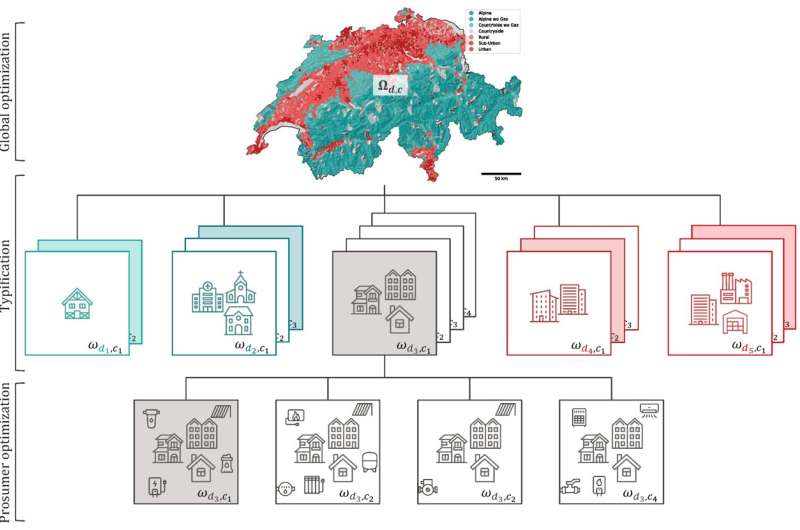This article has been reviewed according to Science X's editorial process and policies. Editors have highlighted the following attributes while ensuring the content's credibility:
fact-checked
peer-reviewed publication
trusted source
proofread
Swiss energy study shows transformative potential of decentralization

Researchers from EPFL and HES-SO Valais Wallis have published a study outlining a path to a more sustainable energy future for Switzerland. The study emphasizes the importance of local energy solutions, and the role of decentralized systems for community empowerment.
A pivotal finding of the study, published in Energies, is the integration of decentralized photovoltaic (PV) systems into the Swiss energy grid; this could reduce annual system costs by 10% and elevate self-consumption rates to 68%. The deployment of such systems could reduce the need for grid reinforcement by up to 43%, with distribution networks remaining only in urban districts due to electrification of the buildings and private mobility sectors.
"Our analysis indicates a tangible pathway towards enhancing Switzerland's energy independence while fortifying the grid's resilience. Adopting a strategic approach to local renewable resource utilization can ensure a consistent energy supply throughout the year," says Jonas Schnidrig, a Ph.D. researcher in the EPFL School of Engineering's Industrial Process and Energy Systems Engineering group (IPESE), led by François Maréchal.
The authors believe that such strategic integration could mean not only a more secure and stable energy supply for Switzerland, but also a reduction in dependence on energy imports. They argue that optimizing local energy production—especially via solar power in winter—and balancing supply and demand with the help of hydropower and biomass using the gas grid infrastructure, is a sustainable and efficient management model.
Community empowerment
The researchers analyzed the Swiss energy model using the multi-energy and multi-sector modeling framework EnergyScope, as well as the Renewable Energy Hub Optimizer (REHO) decision support tool for sustainable urban energy system planning. They argue that their results highlight the "transformative potential" of decentralized energy systems in catalyzing the development of sustainable local energy communities. Their model also allows for the prioritization of regions for PV deployment, demonstrating the economically optimal operation of the energy system depending on the PV penetration rate.
"Our findings demonstrate a clear advantage in promoting decentralized electricity production and consumption. With an investment of 1260 CHF/year per capita in local energy communities, districts can produce about half of the total energy needs of Switzerland by using around 60% of the available roof surface. This model enhances community empowerment and aligns with the sustainable energy future we envision," says Maréchal.
Another notable aspect of the research is its strategic focus on deploying PV systems in urban environments, which significantly minimizes ecological impacts while maximizing efficiency. This approach suggests a considerable reduction in ecological footprint compared to the potential impact of high alpine PV installations, ensuring the preservation of Switzerland's natural landscapes and a sustainable pathway for the energy transition.
More information: Jonas Schnidrig et al, Power to the People: On the Role of Districts in Decentralized Energy Systems, Energies (2024). DOI: 10.3390/en17071718


















